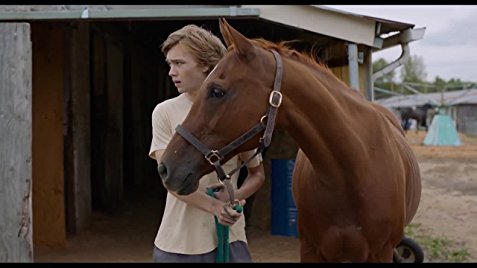Haigh spent years working on Looking, a series about as far from Lean on Pete as possible. Its wealthy tech worker protagonist laboring in San Francisco had his basic needs covered, allowing him to think about life goals and emotional well-being. Lean on Pete is far more dire, before and after the fulcrum decision of the film. It even bears a small-c conservative streak in its appreciation of physical/service labor and the value of strong parenting. Charley is invigorated by his work in the stables, no less so by the sweat equity he puts into it. Away from the physical aspect of his work with Del is the caretaker aspect, a role Haigh practically idealizes both in how gently and fervently Charley cares for Pete but also in an early piece of advice imparted to Charley about how every good woman waited tables at one point in her life, a pronouncement that looms over the rest of the film.
The parenting thread is one that Fimmel and Haigh are narrowly able to make work, in that Ray shouldn’t come across as a hateful or neglectful person, but he must come across as a bad father. With the former, as written and performed, he’s too charming to be dislikable, and if Charley likes him, then that’s as good a vouch as any. On the latter, any social worker worth their salt would immediately see that the Thompson home is not an ideal place to raise a boy, but they would have to dig harder to find the ways in which Ray has utterly failed. The impetus put on caretakers is only fulfilled when the party being cared for asks for or accepts help, and Ray’s pride, imparted to his son, has made Charley incapable of either. Not only has Ray made his son responsible for their financial survival and thus robbed him of a chunk of his childhood, but when it comes time for a 15 year old kid to open himself up to another person as his situation spirals out of control, he simply can’t do it.
The tragic parts of Lean on Pete are amplified by how vulnerable and transparent Plummer plays Charley. When Pete’s racing, Haigh will often leave the camera on Charley, letting the result play out on his expressive face. Victories are rewarded with beaming, full-faced smiles, and defeats with crestfallen disbelief and dread. Plummer runs the gamut between those two poles, eventually adding anger, desperation, pensiveness, and shame. It’s a wide-ranging performance that locks itself into the viewer, giving the film an ironclad rooting interest. The film surrounding Charley is crucially not a joyless slog of misery porn, and much of that is credited to Plummer making the absolute most of the times when things are good. Riding in the back of Del’s truck between races with his face taking in the sun and the mountains is, for Charley, as good as it gets. That happiness has to carry him and the viewer through the bad times, keeping both hopeful for some semblance of peace and stability.
Supporting Plummer at the track are Buscemi and Chloe Sevigny as Bonnie, a jockey that Del hires to ride Pete. Both are superb, fleshing out well-drawn characters with nuance and history. Between them and Charley, there’s a progression from wide-eyed optimism to a colder cynicism and a mercenary resentfulness towards the horses, but again, like with Ray, Lean on Pete allows these characters room to be flawed and appealing at the same time. Buscemi and Sevigny both infuse their characters with tiny flashes of their original love for the sport, but Del has so little to show for his decades-long career while Bonnie has badly damaged her body. They share a rueful acceptance of their lot in life, and they take no joy in their efforts to convey to Charley the harsh realities of horse racing.
Way down the cast list, Haigh gives characters with a fraction of the screentime just as much pathos and earned feeling. An interlude at a secluded home full of veterans finds more reticent masculinity, and a heartbreaking turn from Teyah Hartley as a peer of Charley’s gets at yet another kid not getting what they need from the people around them. Every corner of Lean on Pete carries the possibility of an earnest plea for connection, putting the viewer in a fully realized and thematically consistent world.
Haigh, with his growing resume of distinctive films and the performances that inhabit them, will likely continue to chart his own path, but there’s a filmmaker Lean on Pete strongly evokes. Another chronicler of the lonely and spare West, Kelly Reichardt, practically made this same film with Wendy and Lucy, in which an impoverished lead and her animal companion try to stay together and improve their situation. Haigh borrows from a director worthy of imitation. There can never be enough of the kind of films Haigh and Reichardt are making, where the directors are showing how dangerous and futile isolation and pride can be even as they’re taking advantage of the vast, empty, picturesque expanse of the West. A-

 RSS Feed
RSS Feed